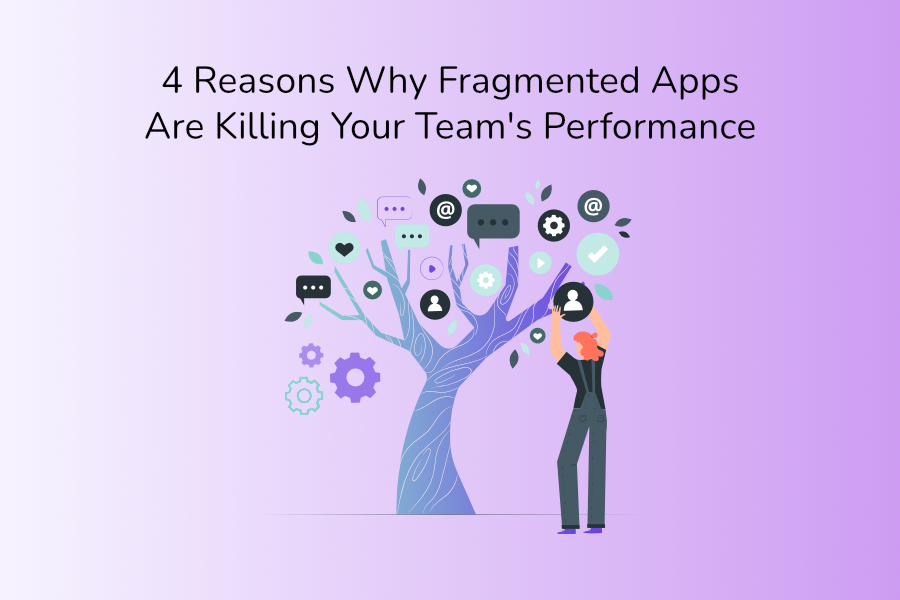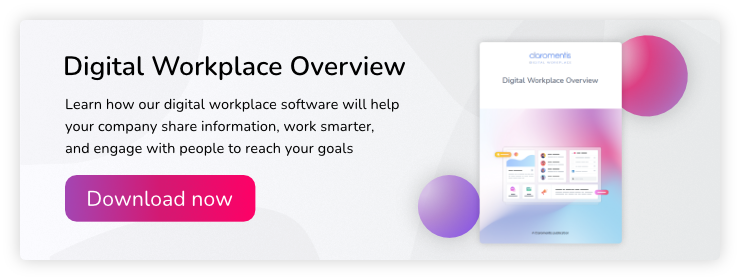Maintaining team performance levels over the past 12 months has been a challenge to say the least. Staff have had to adjust to new routines, attend endless (and exhausting) video meetings, and navigate the unpredictable battleground of Covid-19, all of which can dampen motivation – and ultimately lead to a drop in performance and goal setting.
But other factors can limit team members’ performance too – namely a lack of decent technology.
Indeed, our Remote Work in the UK Report revealed that better business software, project management tools, and process automation were needed to improve productivity, with 40% of all responses referring to some form of tech investment being instrumental to performance.
Most tellingly, 30% of respondents feel they urgently need their employer to move away from lots of fragmented apps to one tech solution that does it all. Staff are feeling the pinch of using a patchwork of disconnected apps that don’t talk with each other, and it’s hindering their productivity.
Here’s why fragmented apps are such a productivity-killer, and how you can improve team performance via more streamlined tech:
Why fragmented apps are impacting team performance
Disconnected apps cause distractions
According to a 2018 report by Symantec, the average enterprise uses more than 1,500 cloud apps to run their business. It’s hard to believe there are organisations out there using that many different systems, but even harder to stomach is its impact on team performance.
Research collated by Forbes reveals that workers are having to switch between apps 10 times every hour. This constant context switching is resulting in 32 days of lost productivity per year.
Effective team work is being hindered by too many apps that are causing far too many distractions. This leaves very little time for creative work or focussed problem solving, both of which require concentration.

Too many apps can hinder your teams’ concentration levels
High performance teams don’t need 1,500 apps – they need a curated selection of relevant business tools that empower them to work productively. This is where intranet platforms come in. They house all the apps teams need in one place, so they don’t have to spend their time toggling between tabs, windows, emails, and apps. And this is the very thing that 30% of our survey respondents are urgently calling for.
Staff can’t find a reliable source of information
What happens when a company has numerous apps but they all contain different data sets?
Your staff will be frustrated for one thing, because they won’t know which system holds the most up-to-date and accurate information.
This means your team’s performance will suffer. A lack of reliable information is especially problematic for client-facing teams, who rely on up-to-the-minute data to provide high levels of customer satisfaction.
Instead, teams need a digital workplace that centralises all important data in one location, providing them with a single source of truth. Version control functionality gives staff complete visibility on which information is most recent, so they can feel confident that they have accurate data. If in doubt, staff can ask any clarifying questions to their team leaders by using in-built tagging and comments features.

Staff can be sure that documents are up-to-date thanks to version control functionality
Staff have to learn how to use lots of different software
On an individual level, learning how to use a new app is part and parcel of working life and continuous professional development. Staff need to invest their time into understanding how their organisation’s software and systems work, especially if they’re new to the company.
However, if teams are having to learn the ropes for a multitude of apps (think back to that 1,500 figure above) the time spent getting trained up multiplies. That’s a lot of hours for your teams to commit to, which could otherwise be spent on actual work or training programs that deliver long-term career benefits.

Learning how to use a countless number of apps could detract from valuable training time
By using streamlined tech instead, your teams only have to learn one system. You could even turn it into a team building opportunity, where a few days are set aside for different departments to learn the software via collaborative workshops.
More apps mean another set of login credentials
According to a 2020 study, the average person has between 70-80 passwords for their various online accounts. That’s a lot to remember. So it’s not surprising that many people reuse passwords or create ones that are easy to recall – and therefore easy to hack.
The more apps your organisation uses, the more passwords your staff have to create and remember. And this is where corners may be cut. Staff may reuse passwords or set ones that are easy-to-guess. This could ultimately lead to security vulnerabilities and a real risk of losing valuable data.
By reducing the number of apps, and opting for a system that does it all, your staff only have to remember one set of login credentials. This will reduce security risks and save your staff the headache of remembering yet another password.






